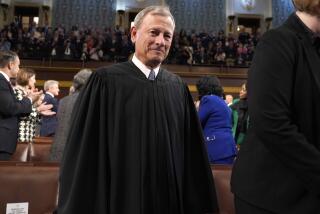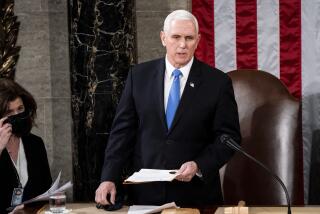Deal Sought on Rice Testimony
- Share via
WASHINGTON — The White House worked quietly Monday to find a compromise with the Sept. 11 commission that would end a standoff over whether national security advisor Condoleezza Rice should testify under oath about the Bush administration’s efforts to prevent and combat terrorism.
In public, White House officials continued to hold firm on the principle of executive privilege, saying that Rice was willing to talk to the commission privately but not to testify under oath in public.
“Our position remains where it is,” White House Press Secretary Scott McClellan told reporters on Air Force One, as President Bush returned to Washington after a weekend on his Texas ranch.
But privately, White House officials said they were looking at various options, short of public testimony, that they hoped would satisfy the commission.
“We’ve been looking for compromises and solutions,” one official said. “We’ve been trying to be as cooperative as we can be within the confines of executive privilege.”
Al Felzenberg, spokesman for the Sept. 11 commission, said no formal compromise offer from the White House was “on the table,” but indicated the commission is discussing the matter with the White House.
“We do talk to them routinely,” Felzenberg said. “I would be surprised in the course of that if [compromise proposals] didn’t come up.”
He reiterated that all 10 commissioners -- Democrats and Republicans -- wanted Rice to testify publicly about allegations by former counterterrorism official Richard Clarke that the Bush administration did not take the threat of terrorism seriously before the Sept. 11 attacks on New York and the Pentagon.
Two Democratic senators, Edward M. Kennedy of Massachusetts and Charles E. Schumer of New York, planned to introduce a formal resolution today in the Senate calling on Rice to testify under oath.
Republicans, too, have urged the White House to consider waiving its right of executive privilege, a legal principle that holds that the president’s White House staff reports directly to him and is not required to answer summonses from Congress. The idea behind the principle is that the president’s advisors should be free to give him unfettered advice; public officials who are confirmed by the Senate, however, cannot claim executive privilege.
Some Republicans say they fear the controversy, if it lingers, could undermine Bush’s chief rationale for reelection: his leadership of the war on terrorism. But two new polls released Monday suggested that Bush had not suffered significant damage from the controversy.
A nationwide poll over the weekend by the Gallup Organization showed Bush’s approval rating holding steady at 53%. Three weeks ago, 50% of Americans said they approved of his performance as president, a result within the poll’s 3% to 4% margin of error.
Similarly, a Pew Research Center survey showed Bush gaining on his presumed Democratic opponent, Sen. John F. Kerry of Massachusetts, despite the Clarke affair.
According to Pew, Kerry held a 52%-43% lead over Bush earlier this month. By the weekend, the two were statistically even, with 46% favoring Bush and 47% favoring Kerry. The poll had a margin of error of 3% to 4%.
The Pew poll contained some worrisome news for Bush: He may be losing some support from swing voters. Earlier this month, 72% of those who the Pew Center identified as uncommitted to Bush or Kerry said they believed Bush could best defend the country from the threat of terrorism. By the weekend, that had fallen to 50%. Kerry, however, failed to make up the difference, with only 13% giving him their preference on the issue of terrorism, statistically even with his 11% result earlier in the month.
In the search for resolution to the controversy, several possible compromise scenarios of uncertain origin wafted around the Capitol on Monday. One would have Rice speak to the commission privately but then release text of some or all of her remarks afterward. Another would be for the White House to release or declassify her previous comments to the commission.
It was unclear whether anything short of sworn testimony in public would satisfy the commission. Felzenberg declined to comment on how the commission might view such offers, saying the scenarios were hypothetical. He noted that the commission did not have the authority to declassify material.
Rice has spent four hours with the commission behind closed doors. White House officials say Rice is eager to meet with the commissioners again to rebut the charges by Clarke, who held national security posts in the Bush and Clinton administrations.
Clarke’s new book, “Against All Enemies,” ignited the current firestorm, which was further fanned by his testimony before the commission last week.
Clarke’s charges prompted a fierce counterattack from the White House, during which Rice took the lead, giving numerous interviews. Her prominence on the issue, and the fact that she was Clarke’s boss when he served in the White House, increased the calls from the commission for Rice to submit to public questioning.
Commissioners, including the Bush-appointed chairman, former Gov. Thomas H. Kean of New Jersey, said Rice’s refusal to testify would leave a significant hole in the public record.
“She could greatly enhance the public understanding of Bush counterterrorism policy from the time it took office,” Felzenberg said. “It would be unfortunate not to have her perspective and account in the public record.”
Felzenberg said Rice was not under oath in her discussion with the commission. Nor was the session recorded, meaning there is no transcript and that the only documentation of the discussion is in commissioners’ notes.
The White House offered Friday to allow Rice to return for follow-up questions, but Felzenberg said that offer has been in place since Rice’s first appearance and does not represent a new concession from the administration.
Felzenberg said that Rice’s refusal to provide sworn testimony also complicated the commission’s effort to resolve contradictions in accounts from multiple witnesses. He noted that Clarke, who has been sharply critical of the Bush administration’s focus on terrorism during its first eight months in office, had delivered all of his testimony under oath, both in closed session and in public.
Rice has a competing view of the administration’s counterterrorism efforts, but the panel could give greater weight to sworn testimony.
“How do you decide what is right?” Felzenberg said. Placing witnesses under oath “helps you resolve contradictions and helps the deliberation.” The White House has argued that testimony from Rice would violate separation of power principles designed to protect senior advisors from being compelled to disclose to Congress their discussions with the president.
Members of the commission argue that the panel is distinct from Congress, which created the panel, and is scheduled to expire later this year. Were Rice to appear she would not set a precedent leading senior advisors to be summoned to Capitol Hill, they contended.
“We’re a one-time commission appointed to investigate the most serious tragedy in American history,” one official said.
Commission officials note that Director of Homeland Security Tom Ridge appeared before a Senate committee last year after a similar scuffle between the White House and Congress. Ridge agreed to speak, but did not do so under oath.
More to Read
Sign up for Essential California
The most important California stories and recommendations in your inbox every morning.
You may occasionally receive promotional content from the Los Angeles Times.













